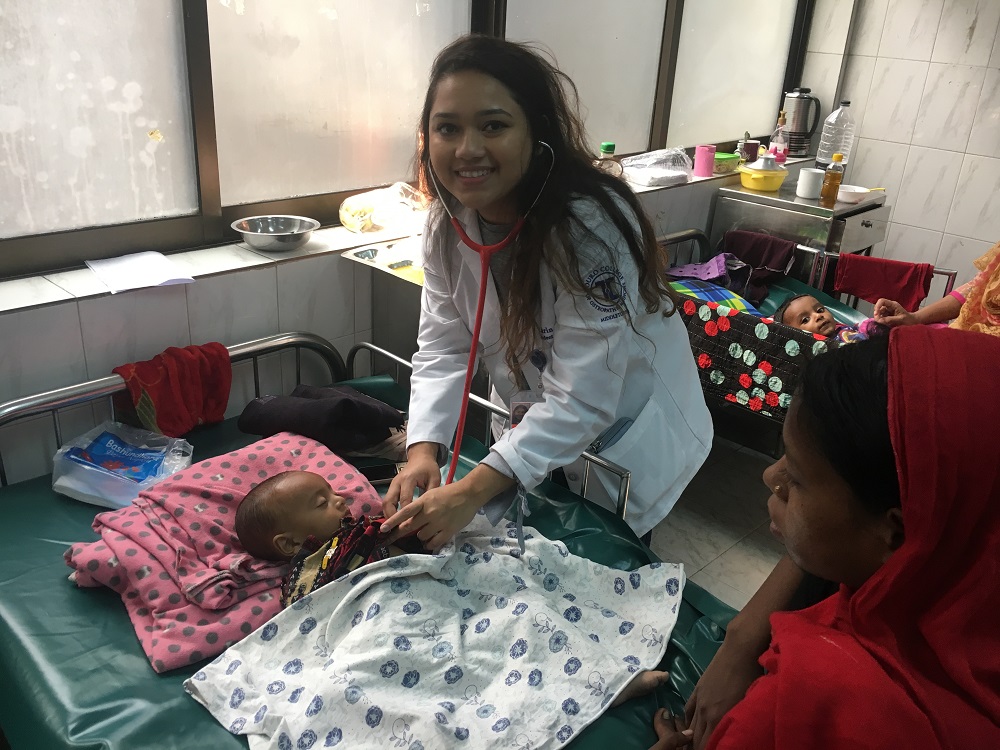Helping the Babies of Bangladesh
OMS I Jarin Prasa Teaches New Mothers About Infant Care

Thanks to the efforts of one TouroCOM Middletown student, dozens of infants in Bangladesh have a better chance at a healthy life.
OMS I Jarin Prasa was born in Bangladesh and came to the United States as a young teenager. She remained close with her extended family, frequently travelling back to the town where she grew up. Whenever her family visited the country, Prasa volunteered with local organizations, including a high school that catered to teenage mothers and a clinic that performed eye surgery.
During the winter break of her first year at TouroCOM, Prasa decided to return to Bangladesh to volunteer, though this time in the pediatric ward of the International Center for Diarrheal Disease Research, Bangladesh (ICDDR,B), a major research center that also functions as a hospital focused on the survival of neonates as well as maternal and child healthcare.
“Bangladesh is a third-world country and the healthcare system has a lot of issues,” she explained. “Since it’s a government hospital it treats patients for free. These patients couldn’t afford treatment any other way: they live in slums or do menial labor. Most of them can’t read.”
Prasa performed rounds with the doctors.
“Malnutrition is common, as is a general lack of hygiene,” she recalled. “You had a lot of babies who came in with severe diarrhea, cholera, typhoid fever, and pneumonia. I had never seen anything like the cases I saw there. There were kids with severe malnutrition from lack of proper feeding. Some were just skin and bones.”
Prasa continued: “The doctors were amazing, but very frustrated with the lack of resources. In one case, there was only one hospital in the country that could test for a specific disease. One of our patients had to stay in the hospital for longer than they needed until the test results came in. By the time we received the result, the baby got hospital-acquired pneumonia.”
Prasa, who is fluent in Bangla, the official language of Bangladesh, said there was a quick learning curve to talking with her patients. “There’s a slang that’s common in the area and you have to use language they can understand.”
Working in the pediatric ward, Prasa had a special advantage. “A lot of the patients were frightened by the doctors because they couldn’t follow what the doctors were saying.”
With her youth and experience working with teenage moms, Prasa formed quick connections with the mothers.
“I wrote down the doctors’ instructions for each patient and then I went back to make sure the patients were following the instructions,” said Prasa. “99 percent of the time they didn’t understand them. Since they can’t read or write I had to tell them over and over, ‘Give this medicine every two hours and this much water every two hours.’”
In addition, because of cultural mores, many of the mothers believed that breastfeeding was unhealthy, a misconception that Prasa corrected. (Many of the mothers were also too malnourished to produce milk.)
The hospital also ran cooking classes to teach the mothers how to make healthy and inexpensive meals, like kitchuri, a dish made of rice, vegetables and lentils. After sitting in on a few classes herself, Prasa began teaching the class. She also worked at the nutritional rehabilitation unit and educated impoverished mothers about the importance of proper feeding and methods for preventing infections.
In addition, Prasa taught the mothers how to make Orsaline, a quick liquid remedy given to counter the loss of fluids and electrolytes from diarrhea. The new mothers also learned about the importance of sanitation and routine vaccination from Prasa.
She returned to the US after working at the hospital for three weeks. She has no regrets for her grueling vacation.
“The days passed so quickly,” she recounted. “I was in awe most of the time. I would rather do this than anything else on my winter break. In medical school, when you’re studying until 3 a.m. every night, you occasionally lose sight of the goal. The whole experience reinforced everything that led me to medical school. I can’t wait to go back.”

